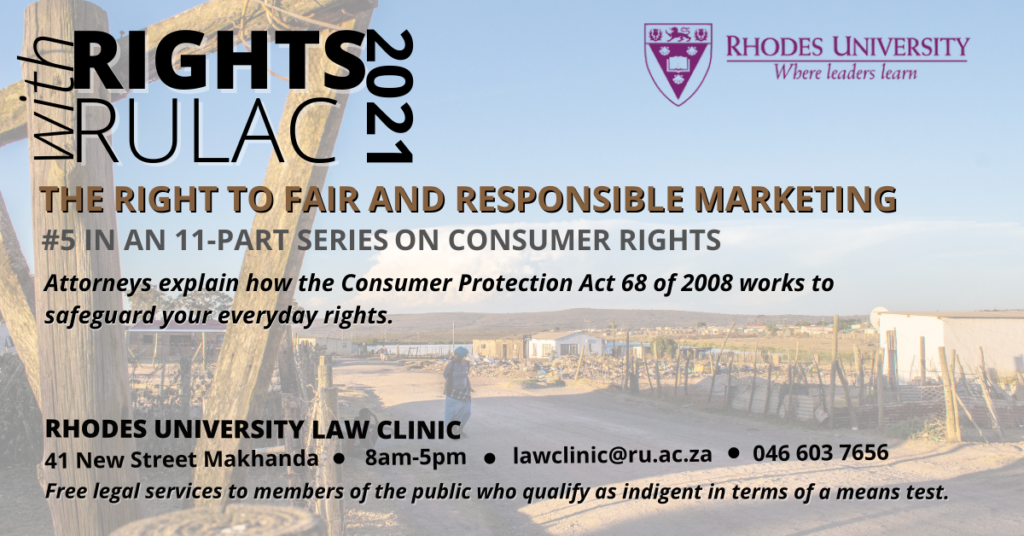By RYAN MCDONALD
The consumer’s right to fair and responsible marketing is governed by sections 29 to 39 of the Consumer Protection Act (‘the Act’).
General standards for marketing goods or services (section 29)
The Act sets out a general uniform standard for the marketing of goods and services. A supplier must not market good or services in a manner that is:
- likely to create a false or misleading representation in respect of those goods or services; or
- misleading, fraudulent or deceptive in any way.
Examples of specific prohibitions and controls against marketing that is misleading or deceptive are then set out in sections 30 to 39.
Prohibitions on Bait and Negative Option Marketing (sections 30 and 31)
Bait marketing refers to the practice where a supplier advertises products or services as being available, or available at a bargain price, only for consumers to find that such product or service is either limited or unavailable. For example ‘Fridges for sale, R100’, when the store only has two in stock. This is explicitly prohibited by the Act, unless stock limitations are expressly indicated.
Negative option marketing refers to the practice in terms of which a supplier claims to have entered into an agreement with a consumer as a result of a consumer not explicitly declining to enter into an agreement. For example, you receive an unsolicited product in the post and do not return it. As a result, a supplier attempts to charge you for it. This practice is prohibited, and any supposed contract concluded in this fashion will be void.
Further specifically regulated marketing (sections 33 to 39)
Catalogue marketing refers to the situation where marketing occurs by advertising brochure (either hard copy or electronically) and a consumer does not have an opportunity to inspect the goods being purchased. In this situation, the Act requires the following to be expressly disclosed to the consumer in any resulting contract, to help the consumer to resolve any resulting problems:
- The supplier’s name and licence registration number.
- The supplier’s address and contact details.
- The sales record.
- The delivery arrangements.
- Cancellation and refund policy.
- Any other relevant information.
The Act also provides very detailed provisions relating to how suppliers may lawfully use and redeem trade coupons (eg those found in newspapers providing a discount on products for sale) and how customer loyalty programmes (eg Smart Shopper cards, eBucks or air miles) must be marketed and honoured.
The Act prohibits marketing whereby a promotional offer is made or a competition is advertised to attract consumers, but without the intention of fulfilling it, or with the intention of misleading the consumer.
For example, a common occurrence in South Africa is receiving a SMS along the following lines:
‘CONGRATULATIONS!! Your number was entered into a draw and you have won R250 000.00. All you have to do is phone 08600 123 524 to claim your prize’.
When you receive an sms like this, you are led to believe that you have actually won a competition. However, you have not because if you contact the supplier you are told that to win the prize you must engage further with the supplier. Companies do this so that you spend more money in the hope that you will win. Such practices are not permitted.
Section 36 of the Act requires that:
A supplier may not tell consumers that they have won a competition if:
- There is no competition
- The person has not won
- The person must pay more money to win the prize.
A supplier cannot tell consumers they have won a prize when:
- There is no prize to be won.
- The prize is open to a group of people.
- In order to get the prize, the person must pay more money.
The Regulations to the Act go further to protect the consumer. Regulation 11 states that a supplier may not charge more than R1.50 to enter a competition electronically. This means a supplier may not deduct more than R1.50 from your phone when you enter a competition.
Section 38 of the Act also prohibits referral selling. A supplier may not promote or offer to supply goods or services on the ground that the consumer will receive a rebate or commission if the consumer supplies the names of other potential consumers.
Section 39 protects those persons who lack legal capacity to contract. A supplier cannot enter into a transaction or agreement with a mentally unfit customer, or unemancipated minor who was not assisted by his/her parent or guardian.
- Ryan McDonald is an attorney at the Rhodes University Law Clinic
Know your rights as a consumer
This 11-part 2021 series is written by attorneys at the Rhodes Law Clinic. The articles cover various aspects of consumer rights in terms of the Consumer Protection Act 68 of 2008. Here are the articles published to date:
#1 As a consumer, do you have rights?
#2 The right to equality and the right to privacy
#4 The right to disclosure and information
#5 The right to fair and responsible marketing
Rhodes University Law Clinic helping you
The Rhodes University Law Clinic strives to improve access to justice through the provision of free legal services to indigent people in most areas of law. The Law Clinic’s New Street offices are open during ordinary business hours, and their services are available to those members of the public who qualify for assistance in terms of a means test.
For more detail, please contact:Rhodes University Law Clinic
41 New Street, Grahamstown
Telephone 046 603 7656
lawclinic@ru.ac.za


